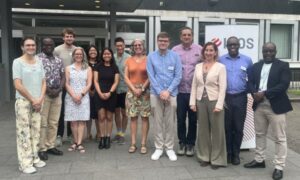On 24 and 25 June, IDOS hosted the first in-person workshop of the BioCAM4 research project. The event brought together partners from seven countries to discuss how to better align climate action and the protection of biodiversity on global and local levels.

Climate change and biodiversity loss are two deeply intertwined crises, yet they frequently remain addressed separately. The BioCAM4 research project addresses this gap by assessing nature-based climate actions globally and locally. A global mapping will shed light on the distribution, patterns, and performance of NBCA initiatives. In addition, case studies in four countries examine concrete interventions, their effectiveness, and how they relate to the social-ecological dynamics of their specific landscape. These insights will inform more coherent and impactful policymaking across scales.
Highlights of the Bonn workshop include the presentation of a global mapping of over 120 NBCA initiatives, showing how spatial data can contextualise interventions and better connect policy and practice. Cases from Costa Rica, Guatemala, Kenya and Rwanda highlighted the challenges that concrete landscapes are facing with regard to climate adaptation. For instance, the contrast between a changing project and funding environment and persisting on-the-ground issues underscored the need for holistic and systemic approaches co-produced with affected communities and informed by local knowledge.
Throughout the workshop, participants emphasised the need for integrated approaches, inclusive governance, and effective communication strategies, especially in light of upcoming policy processes such as the COP30 in Belém. BioCAM4 aims to contribute by building bridges between regions, agendas, and scales of action.

Schreibe einen Kommentar